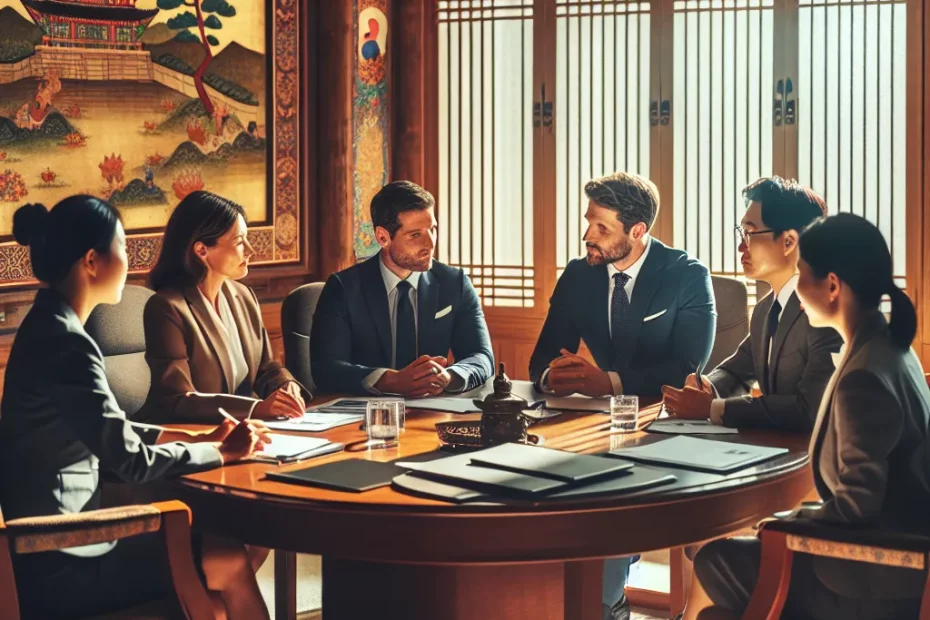As you prepare to engage with Korean business partners, it’s essential to understand the nuances of polite communication and cultural etiquette. Building strong relationships and successful negotiations require more than just language proficiency – it’s about respecting traditions and customs. From addressing your partners respectfully to navigating the intricacies of meetings and negotiations, every interaction is an opportunity to showcase your understanding and appreciation of Korean business culture. Let’s explore some key tips and strategies to help you make a positive impression and foster fruitful collaborations with your Korean counterparts. Remember, a little cultural awareness can go a long way in building trust and rapport in the business world.

How to Address Korean Business Partners
When engaging with Korean business partners, it is crucial to understand and adhere to the proper etiquette to ensure effective communication and successful negotiations. Addressing your Korean counterparts in the appropriate manner is a key aspect of showing respect and building strong relationships in the business world. Let’s delve into some essential tips on how to address Korean business partners with politeness and professionalism! 🤝🇰🇷
Formality in Addressing Korean Business Partners
In Korean business culture, hierarchy and respect for seniority play a significant role in interactions. When addressing your Korean business partners, it is essential to use the appropriate titles and honorifics to show respect. Referring to someone by their title followed by their last name is a common practice. For example, using “Director Kim” or “Manager Lee” is more appropriate than using just the first name.
Importance of Titles and Honorifics
Titles are highly regarded in Korean business settings, and using them correctly demonstrates your understanding of the hierarchical structure. Addressing someone with the appropriate title shows that you acknowledge their position and authority. When unsure about the correct title to use, it is advisable to err on the side of formality and respect.
Politeness and Formality in Communication
In Korean business culture, politeness is highly valued, and using polite language and honorifics is crucial in all forms of communication. When speaking or writing to your Korean business partners, incorporating polite phrases such as “감사합니다” (thank you) and “죄송합니다” (I’m sorry) can go a long way in fostering positive relationships.
Building Rapport through Respectful Address
Addressing your Korean business partners with the appropriate level of formality and respect is not only a sign of courtesy but also a way to build trust and rapport. By showing that you understand and appreciate Korean business etiquette, you are laying the foundation for successful collaborations and long-lasting partnerships.
In conclusion, mastering the art of addressing Korean business partners with politeness and professionalism is a crucial step in navigating the intricacies of Korean business culture. By paying attention to titles, honorifics, and overall etiquette, you can enhance your communication skills and establish strong connections in the dynamic world of Korean business. Remember, a little respect goes a long way in forging meaningful business relationships! 🌟🇰🇷
Key Etiquette for Introducing Yourself
Hello there, dear readers! Today, we are going to delve into the essential etiquette for introducing yourself in a professional setting, particularly when engaging with Korean business partners.
Respectful Greeting
When initiating a conversation or meeting with Korean business associates, it is crucial to start with a respectful greeting. A common practice is to offer a slight bow along with a warm smile. This gesture shows your acknowledgment and appreciation for the individual you are meeting. 🙇♂️
Introduction with Full Name and Title
Introducing yourself with your full name and title is customary in Korean business culture. For example, “Hello, I am [Your Name], the [Your Position] at [Your Company].” This clear introduction sets a professional tone for the conversation and helps establish your credibility from the outset. 💼
Displaying Humility and Modesty
Furthermore, demonstrating humility and modesty in your introduction is highly valued in Korean business etiquette. Avoid boasting about your accomplishments or using overly assertive language. Instead, focus on highlighting your skills and experiences in a humble manner. This approach resonates well with Korean counterparts and fosters a positive atmosphere for further discussions. 🌟
Exchanging Business Cards
In addition to verbal introductions, exchanging business cards is a common practice in Korean business settings. When presenting your business card, make sure to offer it with both hands and a slight bow as a sign of respect. Likewise, receive the other party’s business card with both hands and take a moment to examine it before carefully storing it. This exchange symbolizes your attention to detail and respect for the individual. 🤝
Remember, the way you introduce yourself sets the tone for the entire conversation or meeting. By following these key etiquette tips, you can make a positive first impression and lay the foundation for a successful business relationship with your Korean partners. Best of luck in your future interactions! 🌸
Navigating Cultural Expectations During Meetings
In the realm of business, understanding and respecting cultural differences is crucial for successful communication and collaboration. When it comes to meetings with Korean business partners, being aware of and navigating cultural expectations can make a significant impact on the outcomes of your interactions.
Korean Business Culture
Korean business culture places a strong emphasis on hierarchy and respect for seniority. Therefore, it is essential to address individuals by their titles and use formal language, especially during initial meetings. Starting the conversation with polite greetings such as “Annyeonghaseyo” (안녕하세요) and showing genuine interest in the well-being of your counterparts can help establish a positive atmosphere for the meeting.
Meeting Etiquette
Maintaining proper etiquette during meetings is highly valued in Korean business culture. It is customary to wait for the most senior person to speak first and avoid interrupting others while they are talking. Active listening, nodding, and showing understanding through non-verbal cues are all appreciated gestures that demonstrate respect and attentiveness.
Negotiation Etiquette
In terms of negotiation etiquette, patience and a collaborative approach are key. Koreans tend to value building relationships and trust before diving into business discussions. Therefore, taking the time to socialize and get to know your Korean partners on a personal level can pave the way for smoother negotiations.
Decision-Making
When it comes to decision-making, consensus-building is often favored over individual opinions. Korean business partners may engage in lengthy discussions to ensure that everyone’s perspectives are considered before reaching a conclusion. Being open to compromise and demonstrating flexibility in your negotiation stance can be viewed positively in this context.
Overall, by being mindful of cultural expectations, showing respect, and adapting your communication style to align with Korean business practices, you can foster stronger relationships and achieve successful outcomes in meetings and negotiations with your Korean counterparts. Remember, cultural sensitivity and effective communication are the pillars of fruitful international business partnerships! 🤝🇰🇷
Strategies for Successful Negotiations
Are you ready to master the art of successful negotiations with your Korean business partners? Let’s dive into some key strategies that will help you navigate meetings and discussions with finesse! 🤝
The Importance of Building Relationships
First and foremost, it’s essential to understand the importance of building strong relationships with your Korean counterparts. In Korean business culture, establishing trust and rapport is crucial before diving into any serious negotiations. Take the time to engage in small talk, show genuine interest in their culture, and always maintain a respectful attitude. Remember, a good relationship is the foundation of successful negotiations! 💬
Preparation is Key
When it comes to the actual negotiation process, preparation is key. Make sure you have a clear understanding of your goals and objectives, as well as a solid knowledge of the market and industry trends. Korean business partners appreciate when their counterparts are well-informed and well-prepared, so do your homework! 📚
Non-Verbal Communication
During the negotiation itself, keep in mind the importance of non-verbal communication. In Korean culture, subtle cues and body language play a significant role in conveying messages. Be mindful of your tone of voice, facial expressions, and gestures to ensure that your communication is respectful and in line with Korean etiquette. Remember, a smile goes a long way! 😊
Flexibility and Adaptability
Flexibility is another crucial aspect of successful negotiations in Korea. Be prepared to adapt to unexpected changes or requests, and always be open to finding creative solutions that benefit both parties. Demonstrating flexibility and a willingness to compromise can go a long way in building trust and reaching a mutually beneficial agreement. 🌟
The Power of Patience
Lastly, don’t forget the power of patience. Negotiations in Korea may take time, as decisions are often made collectively and after careful consideration. Avoid rushing the process and instead, demonstrate patience and perseverance. Trust the process, stay positive, and remain committed to building a strong partnership with your Korean business counterparts. The results will be worth it in the end! 🌈
By following these strategies and embracing the nuances of Korean business culture, you’ll be well-equipped to handle negotiations with grace and success. Remember, it’s not just about reaching an agreement – it’s about fostering long-lasting relationships built on trust, respect, and mutual understanding. Cheers to successful negotiations ahead! 🌟
As you engage with Korean business partners, remember that effective communication is key to building strong relationships. By understanding and respecting Korean etiquette during meetings and negotiations, you can demonstrate your professionalism and cultural awareness. Always address your partners with the appropriate titles and show respect towards their customs. Introduce yourself with confidence, paying attention to details like business cards and proper greetings. During meetings, be attentive and show interest in what your partners have to say. When it comes to negotiations, be patient and focus on building trust rather than rushing to close a deal. By following these cultural norms and strategies, you can navigate business interactions successfully and leave a positive impression on your Korean counterparts. Remember, a little cultural sensitivity can go a long way in fostering fruitful business relationships.
